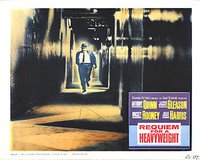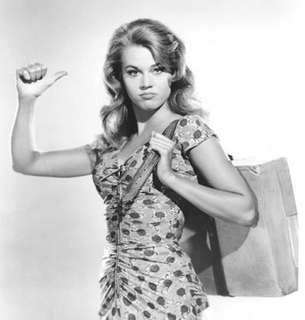 Where "Sweet Bird of Youth" reeked of prestige, "Walk on the Wild Side" was pretty much written off as plain disreputable. But guess what! It's much more entertaining, with beautiful black & white photography, excellent use of locations and some really well-dressed intriguing sets. To say it lacks 30's flavour is unfair. No Hollywood film seriously attempted to do recent period till the late 60's.By that time fashion had finally become more diversely accomodating and film honchos were less terrified of having their stars look slightly out-of-date. At any rate, what's not to like about a film that offers us so many famous actresses all doing their thing - and doing it with relish. Anne Baxter blends her facility with accents (Mexican in this case) with her natural ability to be a Mensch. Capucine does a dialed-down Ingrid Bergman that's, well, restful. Joanna Moore's a memorable (memorably pretty and memorably touching) Miss Precious. And, of course, there's Stanwyck, all icy authority and frustration. But the should-have-been nominee is Jane Fonda.
Where "Sweet Bird of Youth" reeked of prestige, "Walk on the Wild Side" was pretty much written off as plain disreputable. But guess what! It's much more entertaining, with beautiful black & white photography, excellent use of locations and some really well-dressed intriguing sets. To say it lacks 30's flavour is unfair. No Hollywood film seriously attempted to do recent period till the late 60's.By that time fashion had finally become more diversely accomodating and film honchos were less terrified of having their stars look slightly out-of-date. At any rate, what's not to like about a film that offers us so many famous actresses all doing their thing - and doing it with relish. Anne Baxter blends her facility with accents (Mexican in this case) with her natural ability to be a Mensch. Capucine does a dialed-down Ingrid Bergman that's, well, restful. Joanna Moore's a memorable (memorably pretty and memorably touching) Miss Precious. And, of course, there's Stanwyck, all icy authority and frustration. But the should-have-been nominee is Jane Fonda. 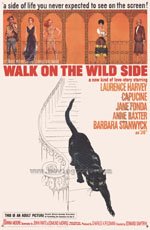 It's only, I think, her second film. And she's already miles ahead of her contemporaries in charisma, confidence and distinctive talent. And how about that dress she changes into at the gas station? She and that particular glad-rag are a match made in pulp heaven. As Kitty, the scrappy survivor who'll do whatever it takes and then some, Jane Fonda is pure snap, crackle and pop. The script asks a lot from Kitty - and Fonda doesn't back down an inch. The real surprise is that it took so long for the actress to consolidate her status in Hollywood. But that's undoubtedly down to her Euro-centric lifestyle, script and marriage choices. She got her first Oscar nomination in '69 as a feisty Depression dame in "They Shoot Horses". But her Kitty in "Walk on the Wild Side" is more than just a dress-rehearsal for that part. It's an impressive accomplishment all on its own.
It's only, I think, her second film. And she's already miles ahead of her contemporaries in charisma, confidence and distinctive talent. And how about that dress she changes into at the gas station? She and that particular glad-rag are a match made in pulp heaven. As Kitty, the scrappy survivor who'll do whatever it takes and then some, Jane Fonda is pure snap, crackle and pop. The script asks a lot from Kitty - and Fonda doesn't back down an inch. The real surprise is that it took so long for the actress to consolidate her status in Hollywood. But that's undoubtedly down to her Euro-centric lifestyle, script and marriage choices. She got her first Oscar nomination in '69 as a feisty Depression dame in "They Shoot Horses". But her Kitty in "Walk on the Wild Side" is more than just a dress-rehearsal for that part. It's an impressive accomplishment all on its own.Shelley Winters in Lolita
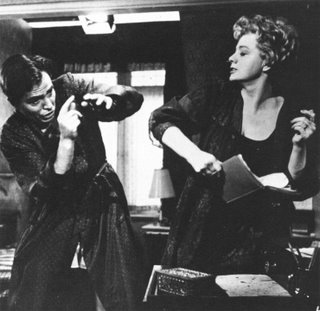 I'm tempted to say Shelley Winters' lack of a supporting nomination for the genuinely epic "Lolita" was because of her star billing. But I think the Oscar voters simply weren't impressed by the film. "Lolita" was years ahead of its time. And the Academy tended to be years behind. Whatever the case, this is a great performance, fully worthy of sharing the spotlight with Lansbury and Duke. There's a fine line between brilliant parody and overkill - and Winters successfully negotiated it more than once - but never quite so adroitly as here. She's hilarious and tragic, scary and pathetic. No one could have gotten more out of Charlotte's affectations ("Shall we have our coffee on the piazza?). Her looks, her movements (that deliciously lumbering cha cha cha),her total oneness with Charlotte's absurd wardrobe - all add flavour to an irresistible Shelley Winters sundae.
I'm tempted to say Shelley Winters' lack of a supporting nomination for the genuinely epic "Lolita" was because of her star billing. But I think the Oscar voters simply weren't impressed by the film. "Lolita" was years ahead of its time. And the Academy tended to be years behind. Whatever the case, this is a great performance, fully worthy of sharing the spotlight with Lansbury and Duke. There's a fine line between brilliant parody and overkill - and Winters successfully negotiated it more than once - but never quite so adroitly as here. She's hilarious and tragic, scary and pathetic. No one could have gotten more out of Charlotte's affectations ("Shall we have our coffee on the piazza?). Her looks, her movements (that deliciously lumbering cha cha cha),her total oneness with Charlotte's absurd wardrobe - all add flavour to an irresistible Shelley Winters sundae. 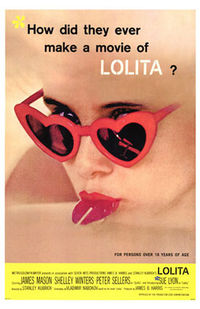 Of course, she shares most of her scenes with James Mason in the performance that represents the single most outrageous omission in Academy history (others that come to mind - Charles Laughton in "The Hunchback of Notre Dame", Dennis Quaid in "Far From Heaven"). Their styles are radically different but when they're onscreen it's a duet made in heaven. Perhaps the picture reaches its giddiest climax when Humbert reads Charlotte's letter declaring her love. (Go! Scram! Departez!). Only Mason is physically there. But Winters has made such a vivid, lingering impression that one can simultaneously hear her voice in the words, all the while revelling in Mason's peerless delivery as he reads and reacts to her declaration. No Tuvan throat singer ever achieved such delicious duality of tone. Hats off to Shelley Winters. In almost any other year, I would have given her the trophy.
Of course, she shares most of her scenes with James Mason in the performance that represents the single most outrageous omission in Academy history (others that come to mind - Charles Laughton in "The Hunchback of Notre Dame", Dennis Quaid in "Far From Heaven"). Their styles are radically different but when they're onscreen it's a duet made in heaven. Perhaps the picture reaches its giddiest climax when Humbert reads Charlotte's letter declaring her love. (Go! Scram! Departez!). Only Mason is physically there. But Winters has made such a vivid, lingering impression that one can simultaneously hear her voice in the words, all the while revelling in Mason's peerless delivery as he reads and reacts to her declaration. No Tuvan throat singer ever achieved such delicious duality of tone. Hats off to Shelley Winters. In almost any other year, I would have given her the trophy.ODDS AND ENDS...
I made a point of revisiting 1962's"Tender is the Night." Joan Fontaine has fun as Baby, the hard-boiled heiress. She's chic, affably brittle and definitely one of several good things in this much-maligned Fitzgerald adaptation. I remember Gena Rowlands as being extra-special in John Cassavetes" "A Child is Waiting", but didn't get a chance to see it again. I did , however, manage to catch up with "Requiem for a Heavyweight" to reacquaint myself with Madame Spivy's butch gangster lady. She's still unsettling but not quite as startling as I remembered. But then I've had 44 years to compose myself.


